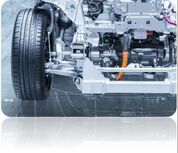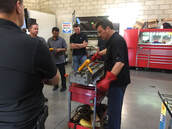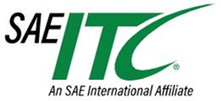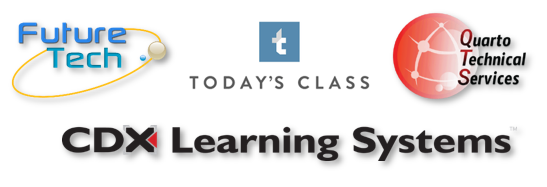Electrified Vehicle Systems for
|

Most automotive service professionals performing (or teaching) diagnostics and service of Battery Electric Vehicles (BEV), Plug-In Hybrid Electric Vehicles (PHEV), and Hybrid Electric Vehicles (HEV) have potentially completed rudimentary training in the areas of: Vehicle architectures and the High Voltage (HV) electrical power fundamentals that dictate the operation and diagnostics of these systems; in addition to High Voltage (HV) safety training in the areas of Personal Protective Equipment (PPE) and limited (or) vehicle specific HV vehicle safety systems.
If the technician (or instructor) received training from an OEM or Aftermarket provider the breadth, depth, and accuracy of the information contained in the training can vary significantly.
If the technician (or instructor) received training from an OEM or Aftermarket provider the breadth, depth, and accuracy of the information contained in the training can vary significantly.

The objective of this training is to ensure that all individuals across all transportation industries are trained in Electrified Vehicle Systems and Technologies consistently to one standard. This training is completed in preparation to perform the practical and written exams for earning the SAE L1 Certification.
This is a Train-the-Trainer experience. Instructors who have completed the training and earned the certification will incorporate the Electrified Vehicle Technology curriculum into public and private transportation training programs. The curriculum is suitable for standardized programs such as those within automotive repair franchises, as well as programs made available by other organization types listed in the table below.
This is a Train-the-Trainer experience. Instructors who have completed the training and earned the certification will incorporate the Electrified Vehicle Technology curriculum into public and private transportation training programs. The curriculum is suitable for standardized programs such as those within automotive repair franchises, as well as programs made available by other organization types listed in the table below.
Shape Divider - Style fan_opacity
Core Elements of Electrified Vehicle Training & Certification
(Click on each tab to the left)
Outcomes for Training and Certification
Professionals and Industries Who Benefit
Primary Governing Standards
The Certification Organization
The Training Content Suppliers
Training Delivery Methods
Responsibilities of Training Host
Post-Training: What's Next?
9
10
11
12
13
14
15
16
17
18
19
20
21
22
23
24
25
26
27
28
29
30
- Identify High Voltage components by visual identification and location on the vehicle and using Service Information
- How to properly select and use testing tool/equipment to measure High Voltage circuits, select which tools, and the associated accessories would be approved by using industry standards
- Test and evaluate the condition of High Voltage gloves
- How to create Approach Boundary areas for vehicles with Exposed Moveable Conductor and Exposed Fixed Circuit
- How to appraise the condition and clean a High Voltage Manual Service Disconnect
- Identify Interlock Circuits by electrical diagram and test its functionality by using hand-held meters and a Scan Tool
- Determine the functionality and performance of an Active High Voltage Bus Discharge circuit by using a hand-held meter, Scan Tool, and Service Information
- Determine the functionality and performance of a Passive High Voltage Bus Discharge circuit by using a hand-held meter, Scan Tool, and Service Information
- Evaluate the functionality of a High Voltage Isolation Fault Detection circuit by using Off-Board electrical tools, hand-held meter, Scan Tool, and Service Information
- Determine the location of an Insulation Resistance Failure by using Vehicle On-Board Diagnostics Systems
- Perform Insulation Resistance testing on High Voltage components by using an Insulation Meter and Service Information
- Perform calculations that determine the minimal threshold level for an Isolation Fault detection diagnostic system
- Demonstrate the general sequential steps in performing the disabling of a High Voltage System on a Live Vehicle
- The benefits of standards-based training and certification in Electrified Vehicle Technologies apply to a wide range of service, engineering, education and other professionals who participate in global transportation industries:
- Agriculture Equipment
- Aircraft EV
- Assembly Plants
- Automotive Dealerships
- Automotive OEM
- Automotive OES
- Automotive Service & Repair Franchises
- Automotive Tier Suppliers
- Automotive Training Institutes
- Buses
- Carbon Neutral Technology Vehicles
- Class 8
- College Instructors
- College, Trade Schools, Universities
- Commercial Class Vehicles
- Construction Equipment
- DSP 20 Groups
- Education Market
- E-Mobility
- Engineers
- First Responders
- Freight and Logistics
- Heavy Duty Vehicles
- Light Duty Vehicles
- Manufacturing Plants
- Marine EV
- Medium Duty Vehicles
- MPDV - Multi Purpose Delivery Vehicles
- Municipalities
- Plant Training Groups
- Private Fleets
- Public Fleets
- Quality Managers
- Safety Workers
- Service Managers and Advisors
- Sustainable Vehicles
- Technical Trainers
- Technicians
- Training Managers
- Training Organizations
- Waste Management
- Workforce Development
- Zero Emissions Mobility
- This outline covers the topical areas associated with HV safety and HV vehicle safety systems that are utilized in the light, medium, and heavy-duty BEV/PHEV/HEV systems. Additionally, the SAE L1 training certification elements are grounded in industry standards that govern both the OEM and Aftermarket spaces.
The Primary Governing Standards: - Probitas Authentication is a multi-sector program offering credentialing services for the aerospace and ground vehicle sectors. Policies and Procedures developed to and compliant with ISO17024 Conformity Assessment – General Requirements for Bodies Operating Certification of Persons.
Supports credentialing programs for:- International Aerospace Quality Group (IAQG) – Auditor Authentication and Training Provider Credentialing
- Aerospace Engine Supplier Quality Group (AESQ) – DPRV Credentialing and Training Provider Credentialing
- SAE J3300 Driving Skills Committee – Personnel and Facility Credentialing
- SAE AS7489 Aerospace Coatings Applicator Committee – Personnel and Training Provider Credentialing
- Training Content Suppliers: Collaborative Partner Businesses include the required training elements addressing standards in support of the certification. They work together to ensure training standards and content continuity is incorporated into their learning products.Adaptive Learning: Today's Class
On-Demand Training: FutureTech Auto
Hands-On Technical Training: Quarto Technical Services (on behalf of FutureTech Auto)
Instructor Toolkit: CDX Learning Systems - On-Demand Electrified Vehicle Training
On-Demand Learning is a training strategy for how a learner gains access to knowledge-based content using Internet enabled device, anywhere and at any time convenient for the user. It is a flexible and cost-effective method for gaining new competencies by itself, or as a primer supporting hands-on training events and other opportunities.
Video Training – live recorded 1 hr. module content (with closed captioning option)
Student Resources – dashboard to manage their learning path, supplemental videos and other content, flip-book of instructor presentation, module assessments and course completion certificates.
FutureTech’s on-demand platform provides the training content creating a customized learning path to support each Level of Certification Requirements.
Adaptive Learning
Adaptive learning is one technique for providing personalized learning, which aims to provide efficient, effective, and customized learning paths to engage each student. Adaptive learning systems use a data-driven approach to adjust the path and pace of learning, enabling the delivery of personalized learning at scale.
Through an app-based delivery platform the user is presented with engaging exercises, step-by-step video demonstrations, and dynamic animations making this a fully interactive experience.
Hands-On Instruction and Practical + Written Online Exams
Duration: 3 Day Event (2.5 Days Instruction, ½ day Practical + Written Exams)
Prerequisite: Successful completion of all Virtual Training Content
Instructor: Dr. Mark Quarto
Hosting Site will receive a Facilities Preparation Guide including tools, supplies, equipment, vehicles, classroom, and shop set-up needed to properly support the training and testing event (Please see list of hosting requirements for more information). - The following tools and resources are required to conduct the on-site lecture and hands-on training portion of the certification:
- High Voltage Class 0 Electrical Gloves (minimum 2 pair) with Leather Overgloves
- DVOM CATIII/100V (Fluke 87/88 or equivalent)
- DeoxIT D5
- SCAN TOOL-S (example: Autel will provide coverage for most vehicles (GM, Honda, Toyota, Lexus, etc.). Ford is an example that requires an OEM integrated Diagnostic System (IDS) or Aftermarket tool (ex: Auto Enginuity) with enhanced CAN
- Hand tools (sockets, ratchets, extensions, screwdrivers, pick-up Magnet, etc.) 1/4" or 3/8" electric drive or air powered
- Torque Wrench capable of 0-132 in pounds (0-15 N.m.)
- Insulation Tester
- Electrical Terminal Removal Tool, replacement terminals and crimper
- Access to OEM Service Information
The host site must also be able to provide the following for the administration of hands-on and lecture training, as well as written and practical exams:- Lecture hall or classroom with screen projection or overhead monitor
- Automotive shop or lab environment for hands-on activities
- Vehicles for hands-on activities (the number of vehicles is dependent upon class/group size)
- Upon successful completion of training and exams with a satisfactory score the following will be available to participants:
- Recertification once every 5 years
- This applies to all Electrified Vehicle Certifications including L1, L2, and L3
- L2 and L3 Certifications
- L1* is a pre-requisite to L2
- L2 is a pre-requisite to L3
- “Refresher” training materials provided within 90 days of re-certification (for a nominal fee – contact FutureTech Auto to purchase)
*An individual can “test-out” of the preparation training for the SAE L1 Certification. Fees apply for taking the test, which is administered by SAE ITC. A study guide is available. Note that this waiver is not applicable to the L2 and L3 Certifications. - Recertification once every 5 years
Shape Divider - Style tilt_opacity
Train-the-Trainer Course Outline
(Click on each tab to the left)
- BEV, EREV, HEV, and PHEV Systems Architectures & Operation
- Systems Topologies: Light, Medium, and Heavy-Duty Systems
- BAS, FAS, BAS+FAS, and Integrated Systems: Pros and Cons
- Vehicle Electrification Terminology
- Conversion Calculations: A Necessary Evil!
- Electric Propulsion Systems
- Rechargeable Energy Storage Systems (RESS)
- RESS Charging Systems: Levels, 1, 2, & 3
- Electric Transaxle Topologies
- Clutch Based Systems
- Clutchless Based Systems
- Propulsion and Regenerative Braking Modes
- BEV
- EREV
- HEV
- PHEV
- Two Motor Systems (AWD and Sport Mode) Driving
- Direct Current (DC) and Alternating Current (AC): The Second Necessary Evil
- DC Circuits: A quick review
- Understanding AC (Sine Wave) Circuits and Power Systems for Diagnostics
- Basic Sine Wave Waveform Calculations
- Inductive and Capacitive Reactance
- Impedance vs. Resistance
- Power Factor
- Frequency and how it effects AC Circuit Operation
- HV Safety & Personal Protective Equipment (PPE) Major Topical Area
- Connector & Cable Color
- Labeling
- HV vs. Low Voltage (LV) Systems Isolation
- Electrical Current Safety Levels
- Ground Circuit (Loops)
- Oscilloscopes or Meters and Ground Loops
- Oscilloscope and Meter and Accessory Category (CAT) Rating Requirements
- High Voltage Gloves and Leather Over-Glove Personal Protective Equipment (PPE) Maintenance, Lab and Field Testing, and Usage Requirements
- NFPA and IEC Requirements for High Voltage Safety PPE, Approach Boundaries, Levels of PPE Requirements vs. Repair Category
- Tool, Equipment, and Arc Flash PPE Requirements
- HV Vehicle Safety Systems Major Topical Area
- High Voltage System Disable Procedure
- Primary metrics and steps in disabling any HV system
- Use of tools, meters, and PPE required in performing disabling
- Performing HV disabling
- Manual Service Disconnect (MSD) Systems
- Purpose and Rationale for the MSD
- Mechanical and Electrical Designs and Rationale for Various Designs
- Locations vs. Requirements
- Maintenance and Cleaning
- MSD Fuse vs. DTC/Status Messages for MSD Fuse Replacement Interval
- Failure modes as applied to Propulsion System Operation
- Using test equipment and Scan Tool to locate and confirm an Isolation Fault
- HV Interlock (i.e., HV Interlock Loop - HVIL) Systems and Circuits
- Purpose and Rationale for HVIL
- Types of HVIL Systems:
- Serial
- Local
- CAN (Controller Area Network) Based Circuits
- Serial, Local, and CAN HVIL Combinations
- Systems and Component Diagnostics
- HVIL Failures and DTCs as applied to Propulsion System Operation
- Using test equipment and Scan Tool to locate and confirm an Isolation Fault
- High Voltage System Disable Procedure
- HV Bus Discharge Systems
- Purpose and Rationale for Bus Discharge Systems
- Active Bus Charge Systems:
- Circuit Card Assembly (CCA) Active Discharge Systems
- Component Based Bus Discharge Systems
- Systems with more than one Active Discharge System
- Passive Bus Discharge Systems
- Discrete component systems
- HV Component systems
- Passive Bus Discharge Systems
- Systems Diagnostics, Failure Modes, and DTCs as applied to Propulsion System Operation
- Using test equipment and Scan Tool to locate and confirm an Isolation Fault
- HV Isolation Fault Systems
- Purpose and Rationale for Bus Discharge Systems
- Isolation Fault Systems
- Classical DC Isolation Fault Circuits and Systems in dynamic system operation
- Classical AC Isolation Fault Circuits and Systems in static system operation
- How Impedance is used to determine Isolation Faults
- Using DC Resistance and AC Impedance to determine an Isolation Fault condition
- Isolation Fault Systems using only AC Isolation Fault Detection in dynamic system operation
- Using vehicle Isolation Fault Diagnostic systems to locate a component or systems level fault condition
- Using test equipment and Scan Tool to locate and confirm an Isolation Fault
- Systems Diagnostics, Failure Modes, and DTCs as applied to Propulsion System Operation
- HV Bus Discharge Systems
Shape Divider - Style tilt_opacity
Hosting a Train-the-Trainer Event
Hosting a training event is an interactive process in which the requirements of the training and certification are aligned with the preferences and capabilities of the host site and participants.
Step 1: Contact FutureTech Auto for an Interactive Conference
An interactive conference lasts approximately two hours. During this time we will evaluate the site and participant group’s unique capabilities and requirements for delivering the training on-site.
Step 2: Review Proposal Details and Coordinate Program Launch
A proposal from FutureTech will consider critical elements such as funding, scheduling, physical facilities, group size, virtual training components, and post-training program implementation.
Step 3: Implement the Customized Plan
Participants will be immediately enrolled in virtual training in preparation for the hands-on Training and Certification event. Upon successful completion of the event all participants will provided the SAE L1 Certification and instructor toolkit.
Complete the form below to request an interactive conference - We will schedule a 2-hour session with you within 24-48 business hours.
An interactive conference lasts approximately two hours. During this time we will evaluate the site and participant group’s unique capabilities and requirements for delivering the training on-site.
Step 2: Review Proposal Details and Coordinate Program Launch
A proposal from FutureTech will consider critical elements such as funding, scheduling, physical facilities, group size, virtual training components, and post-training program implementation.
Step 3: Implement the Customized Plan
Participants will be immediately enrolled in virtual training in preparation for the hands-on Training and Certification event. Upon successful completion of the event all participants will provided the SAE L1 Certification and instructor toolkit.
Complete the form below to request an interactive conference - We will schedule a 2-hour session with you within 24-48 business hours.
Shape Divider - Style fan_opacity








